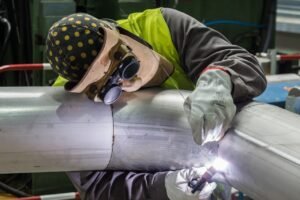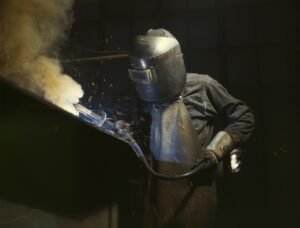do welders make good money?
Introduction
Welding is the art of joining courses of metals by the application of heat and a superior level of accuracy. The profession exists across many sectors of the economy. If appropriately skilled and experienced with a focus on particular specializations, welders can earn very decent wages, and the field is good and beneficial for a lot of people to get into and work in.

Problem
The world is filled with many career choices and many people get to the point of a crossroads when it comes to choosing which path to follow. The high demand for structures to support people’s needs and further development of industries to sustain the needs of society tend to employ welders as the lifeline. One is slightly unsure about the financial returns expected out of this job.
Agitation
When thinking about welding as a job, certain problems seem to come to mind at first. It is acceptable that people would have concerns about who is going to do the heavy work or be exposed to dangerous situations or the belief that skilled jobs do not command the wages they should. Some might even think that the profession is not progressive or that it has no stability, which would aggravate the indecision.
Employees in other industries and sectors may not acknowledge the skill set evolved by welders over many years, thus the form of understating the profession. On the other hand, the elder welders working in the industry may ask, “Am I paid fairly? Is it time for me to get a promotion in the organization or is it time for me to change the industry altogether?
Solution
Let’s find out if welders make good money.

The Data Behind Welding Salaries
Entry-Level Pay
The wage rates are relatively low. First-line employees in welding can earn anything between $15 and $20 an hour, depending on the location and the industry they are in. Those with special certifications or those who are in a high-demand niche can be paid around $25 per hour, which is way above the normal wages for numerous entry positions in other industries.
Experienced Welders
The pay can rise as soon as the welders get more experienced and acquire certain techniques. People with 5-8 years of experience earn between $25 and $35 per hour and $52,000 to $ 70,000 annually.
Geographic Impact
Welder wages also vary across several different factors. Welders can earn higher wages if they are working in areas where there is high demand for such professionals, particularly in Alaska, Texas, and North Dakota, where welding is applied in the production of oil and gas industries as well as infrastructure development.
- In Alaska, the average pay for a welder is $66,610 annually, far above the national median.
- In Texas, welders report an average salary of $58,000 per year.
- In North Dakota, welders average around $60,000.
Specializations That Pay More
Welding offers various specializations that can increase earning potential. Specialized welding is more complex and often comes with higher risks, which is reflected in the pay scale. A few areas where welders can increase their earnings include:
- Underwater Welding: This is one of the well-paid welding jobs available in the market or industry. The annual salary of underwater welders falls in the range of $50000 to $160000 as factors like the location or depth of a job or the risk factor involved are considered. The trade entails extra lessons and licenses.
- Nuclear Welding: Available information also revealed that it has been established that welders in the nuclear industry, especially power plants, earn a premium because of the safety measures that are demanded and the technicalities that are involved. A nuclear welder earns about $70,000-$100, 000 per year.
- Pipe Welding: Field pipe welders, for instance, the ones that deal with pipelines, refineries, or chemical plants, are some of the best-paid welders. Most specify that Gig Economy workers give $60,000 to $90,000 annually, with the cream of Gig Economy workers generating six figures.
- Military and Defense Contractors: Welders working for contractors of military services or defense-related industries may be paid better with a salary of perhaps over $80000. They are involved in various projects, which can include ship construction and production of aircraft, and most of the jobs entail certain security clearance and accreditation.
Additional Earning Opportunities
The number of hours worked by employees is often long in such sectors as oil and gas or infrastructural developments, among others. The welders operating on overtime can get an additional 20-30% in their basic wages, which eventually takes their annual income to over a hundred thousand US dollars.
Most companies today pay their welders for their traveling time, meals, shelter, and transport means. Ironworkers who perform the welding function while undertaking megastructures may earn per diem rates, which forms an extra remuneration channel. Such opportunities can turn welding into a rather profitable job for those who would not mind moving from one place to another for some time.
Real-World Case Study
Mike started welding immediately after high school; at first, he welded small projects in his local area, charging about $15 per hour. Over the years he acquired certifications and set and attained reasonable experience, especially in pipe welding; his pay rose significantly.
By the time Mike was 30, he was earning $85,000 per year, primarily due to his ability to secure high-paying projects in the oil and gas industry. His expertise in welding pipelines made him a sought-after professional. With additional overtime work, Mike now regularly earns between $100,000 and $120,000 annually.
Welding Career Progression and Job Security
According to BLS, welding employment is expected to increase by only 3% during the period 2029. It is not an overstatement, as the demand for professionals with a high level of qualification in welding work in terms of definite segments. A majority of the welders will advance to positions such as welding inspectors, welding engineers, and fabrication shop supervisors, most of which come with better payment packages.

Tips to Become a Certified Welder
To become a certified welder, there are certain procedures that one is supposed to follow, including education, practical experience, and examination. Here’s a detailed guide to help you on your journey:
Complete High School Education
A high school diploma or GED, is typically the minimum educational requirement for aspiring welders. Courses in mathematics, science, and shopping can be particularly beneficial.
Enroll in a Welding Program
You can choose between various educational paths, such as:
- Vocational Schools: Most of these programs take anything between six months and two years and are practical, teaching students body welding techniques.
- Community Colleges: They provide associate degrees in welding technology and such degree programs may take approximately two years.
- Apprenticeships: An apprentice combines work experience with formal learning, which takes three-four years.
Gain Hands-On Experience
Practical experience is crucial. Many welding programs include internships or cooperative education opportunities that allow you to work in real-world settings.
Obtain Certifications
Others are considered useful to enhance your welding profession Certifications are important when it comes to welding career progression. The American Welding Society (AWS) offers several certifications, including.
- Certified Welder (CW): This certification aims to assess your efficiency in performing welding tasks by the market standards. It is skills-based, where you have to prove that you can weld in a certain way to be able to get the job.
- Certified Welding Inspector (CWI): This certification is for those individuals who wish to engage in the inspection of welds as well as the assessment of the quality of the same. This consists of writing several tests testing welding processes, safety, and code requirements.
Pass the Certification Exam
Some of the requirements include writing tests, performance tests, or both depending on the course to be certified. The written exam assesses knowledge of welding theory and safety, whereas the practical part is focused on practical welds.
Maintain Your Certification
Welding certifications, however, have a limited validity period; normally it is for 3 years. To retain the certification, one may have to sit for another exam or accomplish continuing education classes.

Additional Tips
- Stay Updated: Best practices in welding, type of equipment used, tooling, processes and even the safety standard used may change with time.
- Network: Consider joining professional bodies. It would provide the chance to network with other welders as well as to get the latest information regarding jobs in the market.
- Specialize: One could also opt to gain certification in niche courses such as underwater welding, pipeline welding, or nuclear welding to earn more.
FAQs
Are welders well paid?
Welders can earn a good salary; the salary varies depending on the welder’s specialization and certification.
What are the statistics of an average welder’s wage?
The welders in the U.S. are paid their basic wages according to their experience and performance and they receive approximately $45,000-$60,000 per year.
Which welding positions are the best paid?
Some of the best-paid welding jobs are underwater welding and pipeline welding jobs; hence, they would demand higher pay.
Are there ways through which even welders can improve their earnings through certification?
It is that specializations add value to the general skills of a welder and increase his or her earning capacity considerably.
Welding as a job: is it lucrative or profitable?
Welding is a rather safe and promising field that provides stable employment and an opportunity to advance financially.
Conclusion
In conclusion, welders are well-paid for their job. Welding can provide wages equal to or even better than traditional white-collar employment, provided other remunerations such as overtime allowances, traveling allowances, and prospects in the welding careers.
Welders who directly join the job receive over $40000, while those who start as subordinates can earn up to six figures. The way to get through it is to get the right certification, get experience, and look out for opportunities in areas of high demand.
Welding is not only a steady occupation but one where career-orientated practitioners can earn far more than they anticipated. No matter whether you want to begin your career from the bottom or build a career in a different industry, welding is a pretty lucrative job, and it will not put you in a financially unstable position.
Related Articles
- How does fliff make money in 2024?
- how to start an amazon fba business with little money in 2024
- 5 secret websites to make money in 2024


